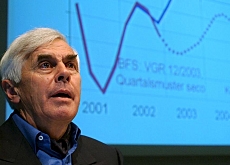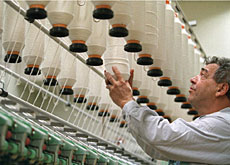Why God is not an economist

Researchers at one of Switzerland’s best-known economic institutions have taken a break from forecasting the future to celebrate the past.
The Zurich Institute for Business Cycle Research, better known by its German acronym KOF, staged a conference on Friday to mark the 50th anniversary of its renowned business and consumer confidence surveys.
In an interview to mark the occasion, KOF director Bernd Schips told swissinfo about the limits of forecasting, and why God was probably not an economist.
At the conference, speakers from major institutions including the OECD and the European Commission told participants why they valued the surveys, which complement KOF’s own economic forecasts by detailing the subjective opinions of major actors in the economy.
They pointed out that, while economic statistics also play a vital role, regular direct surveys of business and consumer opinion help fill in the vital missing link – why people don’t always act the way the textbooks predict.
swissinfo: It’s now 50 years since you carried out the first survey. What have you achieved in that time?
Bernd Schips: Over the past 50 years we have extended the number of firms using our survey information from 30 to more than 6,000, as well as extending the number of sectors.
Business and consumer surveys are now generally accepted as a very important tool both for the development of economic theory and for the preparation of economic policy decisions. The KOF approach is widely spread around the world, with supranational institutions such as the OECD and the European Commission using survey data in the same way.
swissinfo: KOF members have recently criticised the “politicised” approach to the use of economic data by the finance ministry. What is your position on that?
B. S.: That is a difficult question, so we have differing opinions within the institute. Personally, I think the use of economic data, including business and consumer survey data, is not [considered] so important for economic policy in Switzerland as in other countries.
swissinfo: So what exactly is the argument about?
B. S.: Economic policy in Switzerland is guided by certain principles – in particular market opening – which refer to neo-classical growth models, rather than by real economic activity. However, when God created the world, he did not use a neo-classical textbook, so I think we have to make a distinction between real life and textbook models.
swissinfo: How do the KOF methods differ from those used by other forecasters?
B. S.: One problem with forecasting is always the accuracy of input data. Another problem is the method used. Only if you use detailed models of economic activity, [as opposed to basing forecasts just on existing economic indicators and studies] do you have the chance to identify the sources of errors. If you don’t use such models, you don’t know whether the errors were due to faulty assumptions or to your economic theory.
swissinfo: You have said that there are parallels between the problems of economic forecasting and of forecasting the weather. How good a comparison is that?
B. S.: Economic forecasting is much more difficult. In meteorology, you know what the weather is like today and you know what it was like yesterday. In economic forecasting, you don’t yet know what today’s “weather” is really like and you have only a general idea of conditions yesterday [as it can take two to three years to confirm the accuracy of provisional published data].
swissinfo: If we stick with the analogy, weather forecasting in Switzerland is particularly difficult because the Alps constantly upset the models. Is a similar problem for economic forecasters the number of major assumptions built in to any model?
B. S.: That’s right. And it is particularly so in the case of Switzerland, which is a small, open economy dependent on exports. We therefore need to make assumptions about economic developments in the areas to which Swiss goods and services are exported.
So, for instance, to forecast Swiss economic activity, you first have to forecast developments in the European Union. And then there are the elements you simply cannot forecast, such as exchange rates. You can say something about trends, but you cannot accurately forecast what, for instance, the euro-dollar rate will be in three months’ time.
swissinfo: So just how accurate do you think such forecasts can be?
B. S.: Over a six to nine-month period they can be very accurate – indeed, nearly perfect. Beyond that, there are more uncertainties.
swissinfo: Moving to another type of forecast, is there any news yet on the choice of your successor?
B. S.: I don’t know. I hope there will be a decision in the next few months. As you know, I [was supposed to have] retired last October.
swissinfo–interview: Chris Lewis in Zurich
KOF, part of Zurich’s Federal Institute of Technology, enjoys wide respect in both Swiss and international circles.
Unlike many forecasters, who rely on existing data plus in-house expertise, KOF bases its forecasts on complex economic models.
Its main independent rivals, Basel Economics and CREA forecasting centres, use similar methods.
Friday marked the 50th anniversary of KOF’s first business confidence survey.
KOF’s initial client base of 30 has since grown to over 6,000, and its business and consumer surveys have attained international renown.
Economists worldwide agree that such surveys form a valuable complement to the institute’s regular macro-economic forecasts.

In compliance with the JTI standards
More: SWI swissinfo.ch certified by the Journalism Trust Initiative


You can find an overview of ongoing debates with our journalists here. Please join us!
If you want to start a conversation about a topic raised in this article or want to report factual errors, email us at english@swissinfo.ch.